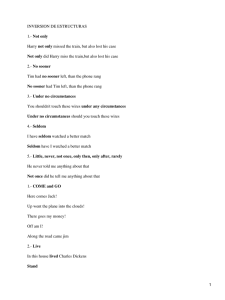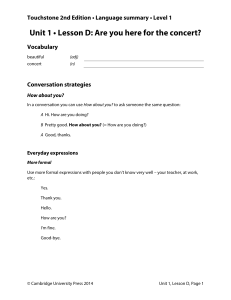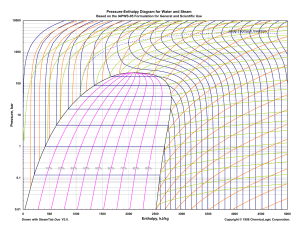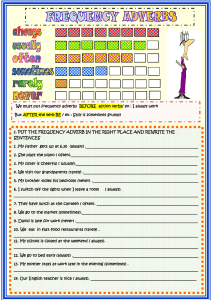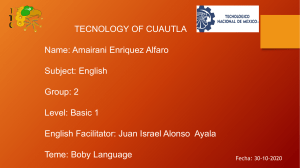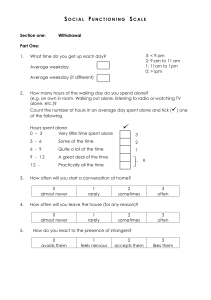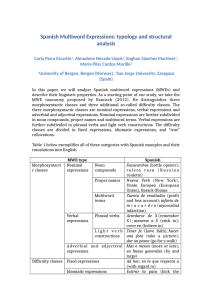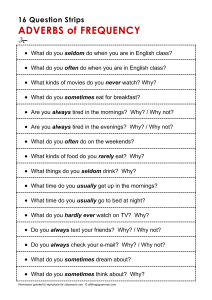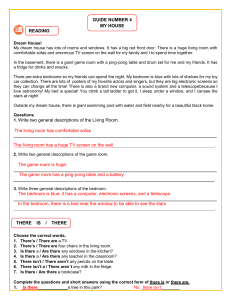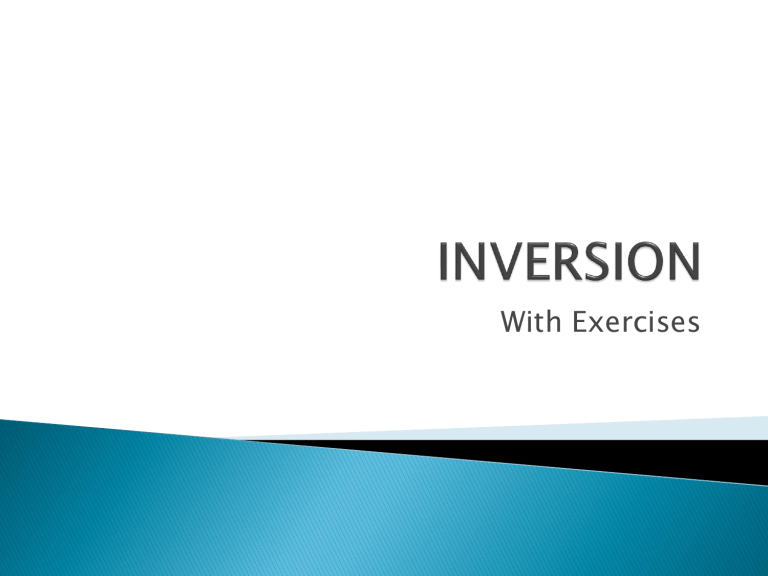
With Exercises Inversion basically means putting the verb before the subject. It is a literary technique in which the normal order of words is reversed, generally for emphasis or special effect. It makes a sentence sound striking or unusual. It also sounds quite formal. Sentences with inversion are less common in ordinary English. In a sentence with no special effect or emphasis, the normal order of words is retained. Example 1 : I have never seen such a beautiful rose. Example 2 : Never have I seen such a beautiful rose. In example 2, inversion is used to emphasise the fact that in your whole lifetime you have not seen such a beautiful rose. In written English, as well as in a very formal style, inversion can be used in the following cases : 1 2 3 4 After negative adverbial expressions. After adverbial expressions of place. After 'seldom', 'rarely', 'never', and 'little‘. After 'hardly', 'scarcely', 'no sooner', when one thing happens after another. 5 After adverbial expressions beginning with 'only' and 'not only' . 6 After ‘so’ and ‘such’ at the beginning of a sentence. 7 Conditionals with inversions. 8 After exclamations with 'here' and 'there‘. 1 ◦ ◦ ◦ ◦ After negative adverbial expressions : Under no circumstances can we accept credit cards. In no way can he be held responsible. At no time did she say she would come. Not until I heard my name did I believe I had won the race. 2 After adverbial expressions of place : ◦ Round the corner came the postman. ◦ On the doorstep was a bunch of flowers. 3 After 'seldom', 'rarely', 'never', and 'little' : ◦ ◦ ◦ ◦ Seldom have I seen such a beautiful view. Rarely did he pay anyone a compliment. Never had I felt so happy. Little did he imagine how dangerous it would be. 4 After 'hardly', 'scarcely', 'no sooner', when one thing happens after another. ◦ Hardly had I begun to speak when I was interrupted. ◦ Scarcely had we started our meal when the phone rang. ◦ No sooner had I arrived than they all started to argue. 5 After adverbial expressions beginning with 'only' and 'not only' : ◦ Only after the meeting did I realize the importance of the subject. ◦ Only when the plane landed safely did he calm down. ◦ Not only was the car slow, it was also very uncomfortable. 6 After ‘So’ and ‘Such’ placed at the beginning of a sentence: ◦ So desperate was their situation that they decided to sell their house. ◦ So quickly did he run that the others couldn't catch up with him. ◦ Such was the wind that we couldn't open the window. 7 Conditionals with inversions: In conditional sentences we can sometimes replace the 'if' with an inversion: ◦ Had I known it would be so difficult, I would never have enrolled. 8 After exclamations with 'here' and 'there' : ◦ Here comes the winner! ◦ There goes all our money! SOME EXERCISES: 1) John had never been to such a fantastic restaurant. Never had John been to such a fantastic restaurant. 2) I in no way want to be associated with this project. In no way do I want to be associated with this project. 3) They had no sooner eaten dinner than the ceiling crashed onto the dining table. No sooner had they eaten dinner than the ceiling crashed onto the dining table. 4) I had scarcely finished writing my essay when the examiner announced the end of the exam. Scarcely had I finished writing my essay when the examiner announced the end of the exam. 5) I seldom leave my house so early. Seldom do I leave my house so early. 6) People rarely appreciate this musician’s talent. Rarely do people appreciate this musician’s talent. 7) If it hadn't been for the bombing raids undertaken by the air force, the battle might've ended differently. Had it not been for the bombing raids... 8) They had met such rude people nowhere before. Nowhere had they met such rude people before. 9) He understood little about the situation. Little did he understand about the situation. 10) The children should on no account go on their own. On no account should the children go on their own.
